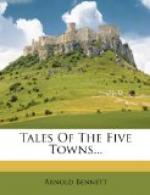The cynosure of every eye was a springless clay-cart, which was being slowly driven past the newly-erected ‘big house’ of Enoch Wood, Esquire, towards the Town Hall. In this, cart were two constables, with their painted staves drawn, and between the constables sat a man securely chained—Black Jack of Moorthorne, the mining village which lies over the ridge a mile or so east of Bursley. The captive was a ferocious and splendid young Hercules, tall, with enormous limbs and hands and heavy black brows. He was dressed in his soiled working attire of a collier, the trousers strapped under the knees, and his feet shod in vast clogs. With open throat, small head, great jaws, and bold beady eyes, he looked what he was, the superb brute—the brute reckless of all save the instant satisfaction of his desires. He came of a family of colliers, the most debased class in a lawless district. Jack’s father had been a colliery-serf, legally enslaved to his colliery, legally liable to be sold with the colliery as a chattel, and legally bound to bring up all his sons as colliers, until the Act of George III. put an end to this incredible survival from the customs of the Dark Ages. Black Jack was now a hero to the crowd, and knew it, for those vast clogs had kicked a woman to death on the previous day. She was a Moorthorne woman, not his wife, but his sweetheart, older than he; people said that she nagged him, and that he was tired of her. The murderer had hidden for a night, and then, defiantly, surrendered to the watch, and the watch were taking him to the watch-house in the ashlar basement of the Town Hall. The feeble horse between the shafts of the cart moved with difficulty through the press, and often the coloured staves of the constables came down thwack on the heads of heedless youth. At length the cart reached the space between the watch-house and the tent of the Inca of Peru, where it stopped while the constables unlocked a massive door; the prisoner remained proudly in the cart, accepting, with obvious delight, the tribute of cheers and jeers, hoots and shouts, from five thousand mouths.
The Inca of Peru stood at the door of his tent and surveyed Black Jack, who was not more than a few feet away from him.
‘Have a glass of my elixir,’ he said to the death-dealer; ’no one in this town needs it more than thee, by all accounts. Have a glass, and live for ever. Only sixpence.’
The man in the cart laughed aloud.
‘I’ve nowt on me—not a farden,’ he answered, in a strong grating voice.
At that moment a girl, half hidden by the cart, sprang forward, offering something in her outstretched palm to the Inca; but he, misunderstanding her intention, merely glanced with passing interest at her face, and returned his gaze to the prisoner.
‘I’ll give thee a glass, lad,’ he said quickly, ’and then thou canst defy Jack Ketch.’
The crowd yelled with excitement, and the murderer held forth his great hand for the potion. Using every art to enhance the effect of this dramatic advertisement, the Inca of Peru raised his bottle on high, and said in a loud, impressive tone:




